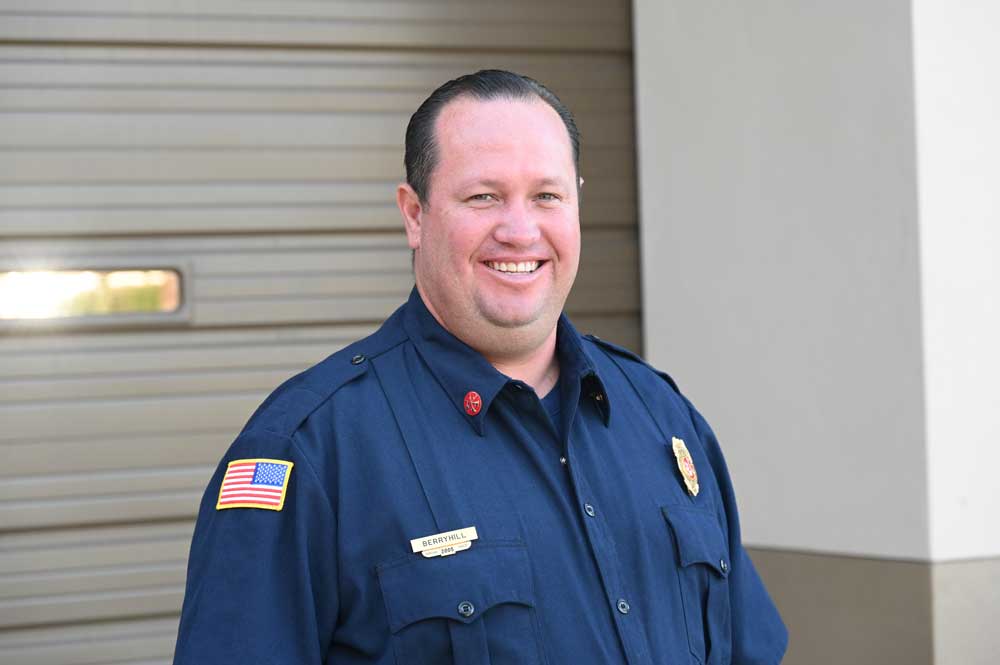
One of the things Kyle Berryhill loves about his job is the appreciation for firefighters and EMTs he senses from the community around him in Palm Coast, day in and day out. It’s not imagined. Year after year in the city’s own surveys, over 90 percent of residents rank the fire department as the highest-quality service they receive. It’s the only department–the only service, the only amenity, the only category–that breaks the 90 percent barrier as consistently.
Berryhill is keenly aware. He also knows it hasn’t happened by accident, or just because firefighters so often bail people out of accidents and other life-altering situations. It’s happened because of stories like the man who had a heart attack while working on hurricane shutters for his home, and who comes back home to find that the fire crews had finished the job for him while he was at the hospital. It’s happened because the guy who had a terrible accident while mowing his lawn came home to find out fire crews finished mowing for him. It’s happened because a firefighter takes the 8-year-old kid who just saw his grandfather die at an assisted living facility and lets him sit at the wheel of the firetruck to get his mind off what moments earlier had been the end of the world for the kid.
“I don’t like the word hope if it’s a substitute of a plan or work or effort, right? I don’t like it in that sense,” Berryhill says. “But I love it in the sense of that as the antithesis of hopelessness, and sometimes the results aren’t the ones we want. But even in those situations, we can bring some peace, some direction, and be kind. And that’s free for us and means a lot to the the to the people that are here.”
This is the Kyle Berryhill who, at just 42 years old–a former English major who this morning carried Graham Greene’s Quiet American and management paperbacks in his backpack, who wakes up before dawn to read and exercise, who speaks of volunteering for Little League and life-saving with the same passions, who has somehow synthesized his mentors’ skills for command with an unassuming humility uncommon in a profession that thrives on brash, a former union president who long ago won the mutual trust of management and the rank and file, a man who considers kindness a mission rather than a slogan–this is the man Palm Coast City Manager Denise Bevan named Palm Coast’s next fire chief Tuesday evening.
It was not a surprise to anyone who’d been paying even a little attention over the past year. The Palm Coast Fire Department under Chief Jerry Forte is the biggest open book in Forte’s famously expansive library. Forte named Berryhill acting chief last year when Forte himself was called to be Bevan’s deputy during a difficult transition period as the City Council wrestled with leadership shocks. When Forte returned to his chief’s duties Berryhill remained a ubiquitous presence at council meetings, often taking the lead on certain issues. He’d been sitting in at many directors’ meetings, with Forte and Deputy Chief Bradd Clark shepherding him through what has been an extended chief mentoring program. He’s been part of this year’s budget talks since the beginning, with Forte as a sounding board and co-pilot. He doesn’t officially take the reins until Forte’s retirement day, October 14, when the city plans an elaborate ceremony.
But in effect, Berryhill is the new chief.
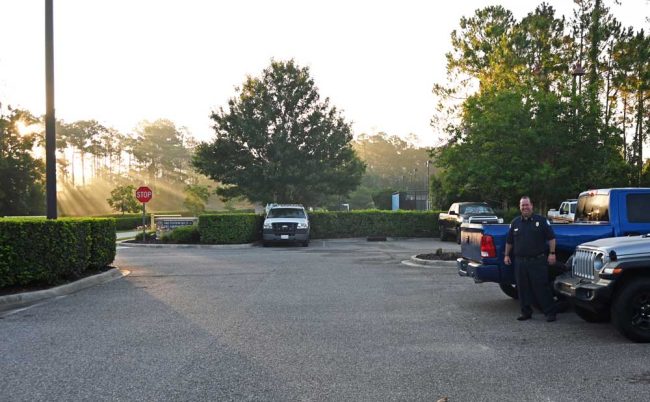
(© FlaglerLive)
Bevan made the announcement an hour into Tuesday’s meeting, calling Mayor David Alfin down from the podium after “celebrating these amazing professionals and their commitment to the organization.” She’d been recognizing several city employees. With Alfin at her side, she thanked Forte for all he’d done, nurturing new leadership along the way (she included herself in that batch). Then she said: “It’s with immense pleasure and pride that tonight I’d like to announce the appointment of our next fire chief, and that is Battalion Chief Kyle Berryhill.” There was a standing ovation, there was a hug between Berryhill and Bevan, and it wasn’t long before Berryhill’s voice cracked as he tried to speak his thanks and his recognition for and pride in his organization.
It was 17 years ago that he’d started as a firefighter-EMT in Palm Coast, his first job as a firefighter, and it will be his last: he doesn’t intend to go anywhere else, or retire for quite a while (“my plan is to go until at least probably 55,” he says). Not that he was fated to this. Search as much as you like: you won’t find firefighters in Berryhill’s lineage. Not even a touch-a-truck-like experience. The family was more into business and sales. “But the culture about service was something that was a part of my daily life,” Berryhill says–inclusion being part of that culture.
One of three boys, he was born in Arlington Heights, Ill., but doesn’t claim that as his native land. He considers himself Floridian, having moved to Central Florida when he was 3. Kyle’s mother was a teacher in the Seminole County school system. (Kyle’s wife, who he met in Palm Coast, is an elementary school teacher in the Flagler school system. They have two young children, a 6-year-old daughter and an 8-year-old son.)
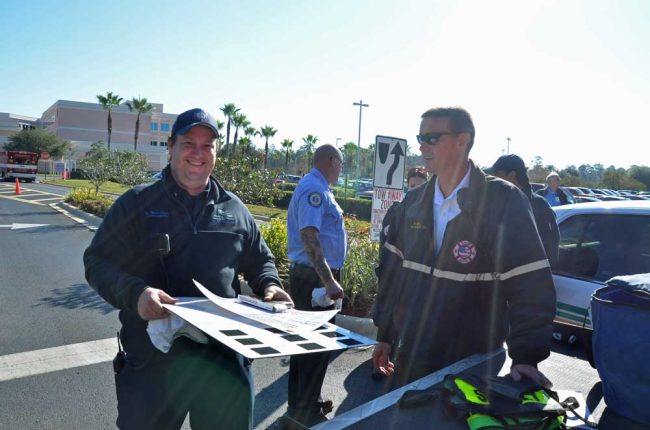
His father and uncle played softball, there was a fire chief on their team. He made an impression, but it wasn’t until many years later that Berryhill turned his eyes to the fire services. He was working with middle school students at a church in Orlando at the time and was trying to figure out a career, possibly teaching, when friends who were in the fire services suggested he give that a look. He did. He was 23, loved the training at the Central Florida Fire Academy at Mid Florida Tech in Orlando, and stuck with it. He took a regional test that landed him on a list that caught the eyes of the Palm Coast Fire Department and was called in for interviews in 2005. There were two interviews, the first with a panel: Lt. Larry Ruggieri, since retired, Sean Major, “who became my first officer and was honestly is as close as I have to brother” (he just retired as a battalion chief), Lt. Jason Wagner, who just marked his 25th year with the department, and Capt. Tom Ascone, who’s still with the department. They threw him a curveball at the end of the interview to see how he’d react–and he obviously passed.
Then came the interview with Mike beadle, the chief at the time. Beadle had put Berryhill so much at ease that at one point Berryhill, reacting to something beadle had said, called the chief “dude.” Beadle looked at him: “Did you just call me ‘dude?'” And Berryhill thought he’d have to look for work elsewhere. But he didn’t. Some time later Forte called him while Berryhill was having dinner with his father at a Mexican restaurant and offered him the job, for around $7.95 an hour. (He is now making $92,000 a year as an hourly employee, before overtime, and as chief will be making somewhere closer in the range of Forte’s current salary of $126,136, though the new chief’s salary hasn’t been determined yet.)
Last night after the announcement at the City Council, Beadle texted him his congratulations. “Thanks for taking a chance on a guy who called you ‘dude’ in the interview,” Berryhill texted back.
When he started, Berryhill lived at the Pine Lakes apartments for a few years, took a second job at Chili’s as a cook for eight years and made it work. The fire department had a $2.5 million budget and 37 full-time employees when Berryhill started. This year’s fire department budget is $11 million, with 66 employees. There were three fire stations in 2005. There are five now, with a sixth, in Seminole Woods, planned for November 2024. Berryhill started at Station 23, the Indian Trails station. He was 25.
He experienced his first major traumatic crash at a scene where an off-road motorcyclist had lost his life, in front of family. Major had prepared him for this and many other situations where the scene is not as final as a death. Major had taught him both to not unnecessarily take on shocks and blame he doesn’t have to and to remember what firefighters can bring to a devastating but not hopeless situation: “We didn’t do what happened here,” Berryhill says. “We’re bringing hope and a chance for something better. We don’t always have the ability to do that. But that’s what we bring, is the hope that we can do that. And so if you have that perspective, then you’re more calm. You’re more able to act effectively.”
It’s not healthy, Berryhill says, for firefighters to feel as if they’ve failed when a situation has turned for the worst–a crash fatality, an engulfing house fire. “It’s much better when you say, okay, whatever happened has already happened. There are going to be some things that I can’t undo,” he says, “but what can I do? How can I look forward? And that’s really been a part of my life that I feel has been helpful because we all go through stuff, right? And being able to look forward and process and make an impact on what’s coming, be present in the moments I’m, is where I think I’m the most effective, where I’m the happiest, where the people around me are the happiest.”
Berryhill’s writing skills very quickly caught the attention of Beadle and others who were not as excited about writing reports. He developed grade-specific, public-education curricula for firefighters’ presentations in schools, and he maintained a rigorous work ethic. He quickly rose in the ranks of the local union, playing a role in its creation, then developed skills negotiating with management–skills that also caught management’s attention at a time when Jim Landon, not known for touchy-feely magnanimity, was the city manager, though Berryhill had a good relationship with him. As president, he managed to “make a lot of positive change for firefighters with Mr. Landon through the union.”
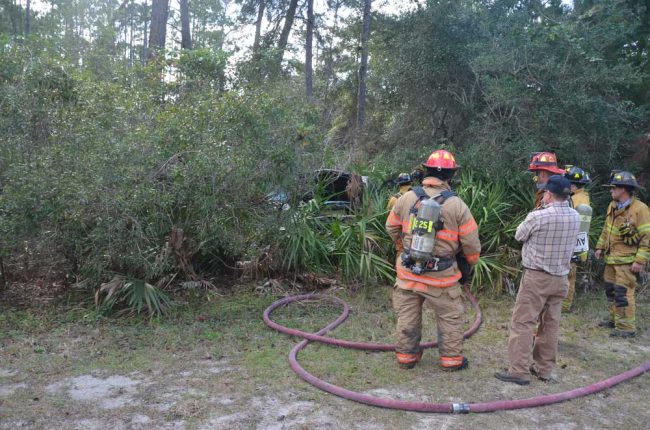
Now he’s on the other side. “One of my favorite things about Ms. Bevan is that she brings a similar level of expertise, but with a different picture just not as heavy handed,” he said. “She’s just so humble. Even though she’s incredibly skilled, you don’t get to see that in leadership very much. So I’m trying to learn from her. Firefighter and humble don’t always go together.” He explained his negotiating approach: “If you and I don’t agree about something, the best way for me to get you to see what I’m seeing is for me to try and see what you’re seeing. If you say red and I say blue, and I can figure out why you’re saying red, then I have the ability to make an impact on what you think. And if I can’t do that, then I’m just tilting at windmills. I didn’t want to engage in conversations that were not productive. I still feel that way today. When it’s time to stand up, you want it to count, so you can’t always be like, ‘Everything is so unfair,’ right? You say–no, this is the thing that we have an issue with. And this is where we want to get better.”
It’s helped that the city has always believed in its fire department–internally and among residents. This is not a department with credibility issues or a place where internal strife has required its own fire-suppressing. The department works, not least because its leadership corps doesn’t have an insecurity problem. It’s among the reasons why Berryhill has managed to zoom past a large number of people of higher rank over the years, without eliciting resentments or untoward jealousies. But his own unpretentious character has a lot to do with that, which is why he is aware of the distance that can grow between managers and “the street,” a distance he doesn’t want to see.
One of Forte’s ways to stay humble is his habit of cooking for every crew at least once or twice a year, which has him cooking in the different firehouses most weeks. Berryhill likes the way Sheriff Rick Staly picked Friday nights, among the busiest nights, to conduct his street patrols alongside the rank and file. Berryhill intends to devote Friday mornings to cleaning and prep duties with individual crews for the same reasons, keeping communication lines open with crews.
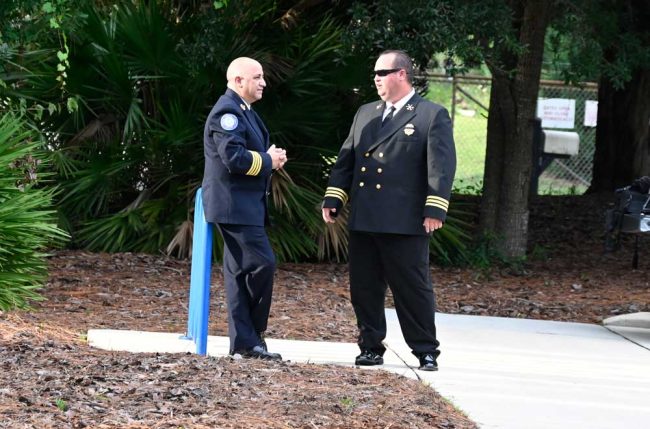
He also has several immediate goals, one of which just changed already: changing the way key performance indicators are measured (for example, improving response times to incident locations is great, but improving outcomes at those locations is better: it’s not just about showing up.) He wants to improve “getting pulses back” in CPR events at incident scenes. And he wants to build-in redundancies in trained personnel, enabling the department to always be ready to essentially staff what amounts to one more fire station than it has. There are seven female firefighters in the department. He wants to increase that number, along with the number of non-white firefighters, with a better recruiting focus in high schools.
And he wants to continue a certain approach Forte instituted, like the way Forte had his firefighters bring pictures of their families to be displayed on a wall. “Because when he makes a dumb decision, he wants to know who it affected,” Berryhill says. “And there’s a lot of ways of that he’s built checks into his power, on purpose. And it’s important.”
Berryhill’s own family of course plays an immense role in his days: he picked Friday morning cleanings with his crews because he can’t spend evening hours cooking at different fire stations. He wakes up at 4:30 in the morning to have time to exercise and read (the Christian author Eugene Peterson, J.D. Salinger’s Raise High the Roof Beam, Carpenters, which he keeps re-reading because he loves the Glass family, and the psychologist and scientist Angela Duckworth this week alone, while still hanging fire over Philip Roth because he fears that starting one book will have him hooked to his next 30), but he puts that aside when his kids start climbing all over him. It keeps him grounded.
He’s also still a Little League guy. Earlier this year the city named a baseball field at the Indian Trails Sports Complex in honor of his late father, Doug Berryhill, in recognition of his many years building up Palm Coast Little League, a tradition Kyle is continuing. “I’m a baseball guy, you take ground balls every day,” he says, not entirely metaphorically.
![]()
City Manager Denise Bevan’s announcement Tuesday evening:





























Justsayin says
Congratulations on your promotion to Fire Chief. Always enjoyed our time at Flagler Collage with you.
Ron says
Congratulations Chief! Keep the troops safe.